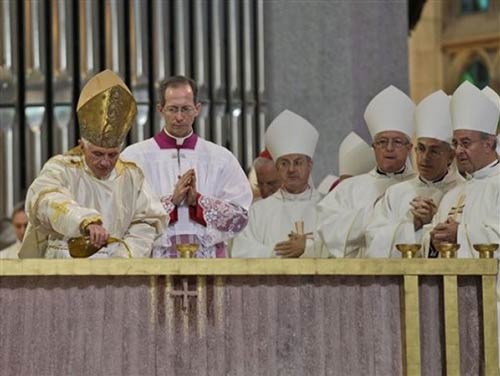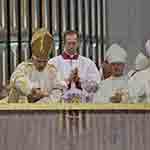
I had promised a continuation of the consecration discussion, and I want to do this now before this site’s Summer slowdown. Do go back to the post about consecration first.
I must admit to more questions and points of discussion than answers. I think my underlying question is: what does “consecration” do? When bishops consecrate a building – what do they think they are doing? What do others think has been done? What has changed? What happens when such a building is deconsecrated?
It seems to me that in the background (and possibly explicitly – someone else might find it), at least of Anglican thinking, are concepts such as the following:
When property has been consecrated it is set apart solely for sacred purposes for all time… This is effected by the Bishop signing the sentence of consecration… It is only when consecrated that a building becomes in the eyes of the law a church.
Once land has been consecrated the land and everything on it comes within the jurisdiction of the ordinary who is normally, though not always, the diocesan bishop…
Some chapels in private premises, for example some school chapels, are consecrated. On the other hand, some Anglican places of worship have been dedicated but not consecrated, thus being set aside for sacred purposes without the legal protection of consecration.
It is … usual for a part, though not the whole of a municipal cemetery … to be consecrated.
In speaking of “set apart solely for sacred purposes for all time”, what is deemed “not a sacred purpose”? When a consecrated building is used for a concert, for an art exhibition, for a play, for a ball, for a dinner, for a prizegiving, for a meeting – are these using it for a sacred purpose?
If the response is that everything is sacred, then is there no distinction between a consecrated and not consecrated building?
Sometimes (often? always?) the altar is consecrated.
Whilst previously, people spoke of consecrating a bishop, as pointed out in the previous post, we now consecrate deacons and priests, as well as bishops. In doing so, are we setting apart such persons solely for sacred purposes for all time? Is there anything not sacred that such a person can do? Would we limit the understanding of consecrating persons to those who are ordained? Or are those who are baptised thereby consecrated? Are all humans consecrated? Is all creation consecrated?
Or, in our ‘relaxedness’ about how we use consecrated buildings are we broadening the concept of “sacred” to the point that we have enervated the idea, removed any potency from the idea?
Or are we, in using consecrated buildings for ‘non-sacred’ purposes in breach of our own agreements?
We (NZ Anglican) have agreements about what we will consecrate in the Eucharist, how we will consecrate this, and what we will do with what is consecrated – and we regularly flout all of those agreements.
Only yesterday, I was in a conversation about the flouting of agreements on how we consecrate deacons, priests, and bishops. Someone (not from NZ) asked if I thought they were valid? I wondered if that question would even be asked here. What percentage, say, of clergy could articulate (without looking it up) the concept of validity and its requirements? Is it part of the training of any/many? Another way to look at this returns to the “how do we consecrate?” and “what does consecrating effect?” questions. [Actually, there is one iteration of all this that occupies overmuch ecclesial energy: the consecrating of couples and of sex].
Reflecting on what is “sacred”, and how “sacred” and “not-sacred” connect, and how “not-sacred” is transformed into “sacred” are important parts of the season when we celebrate the Incarnation.
During this Southern Hemisphere summer holiday period posts will be less frequent, and there will be no invitation to add comments.
If you appreciated this post, do remember to like the liturgy facebook page, use the RSS feed, and signing up for a not-very-often email, …




I think that the consecration of Churches, and a distinction between the sacred and the profane have their merits.
But is there really such a boundary ?
Are there not times when the secular world may have a better grasp of the sacred than the Churches (as Bosco alludes to in the last sentence of his penultimate paragraph) ?
Whoever consecrated the Blessed Virgin Mary ?
Perhaps there is a message in this Sunday’s readings on buildings dedicated to God vs God’s holy presence in people ?
Sister Barbara Reid Op writes:
“Mary makes a physical home for the Holy One in her womb; hers was a unique role. But we too are asked by God to make a dwelling place within ourselves and within our world for the Christ. It is not in glorious buildings beautifully adorned but in the humblest of persons, in the most difficult of circumstances, that God takes up residence.”
Many Blessings
Yes, Chris. I don’t suggest we stop consecrating. But I hope that the way we treat, say, consecrated bread and wine as sacred, will help (enable) us to treat people and creation as sacred beyond our consecrated space. And, as you say, the non-sacred/secular world often gets there before us.
As for Mary (good preparation for Advent 4), we had a good discussion around this recently in encouraging us to become containers of the Uncontainable.
Blessings.
Have you any examples opf Anglican Consecration rites ?
Bruce, there’s plenty of online rites of consecrating people, and of bread and wine. Here’s our Prayer Book. I wondered if you cannot find rites consecrating buildings? As I said, I don’t think NZ has such an agreed rite (if we do, can someone please correct me and point to it – there was one contained in the 1959 SPECIAL FORMS OF SERVICE sanctioned for use in the Church of the Province of New Zealand).
When I searched online for one, TEC clearly has an agreed rite (pp. 567-574). Beyond searching further, you could email some bishops, and general secretaries. I hope that’s a start. Blessings.